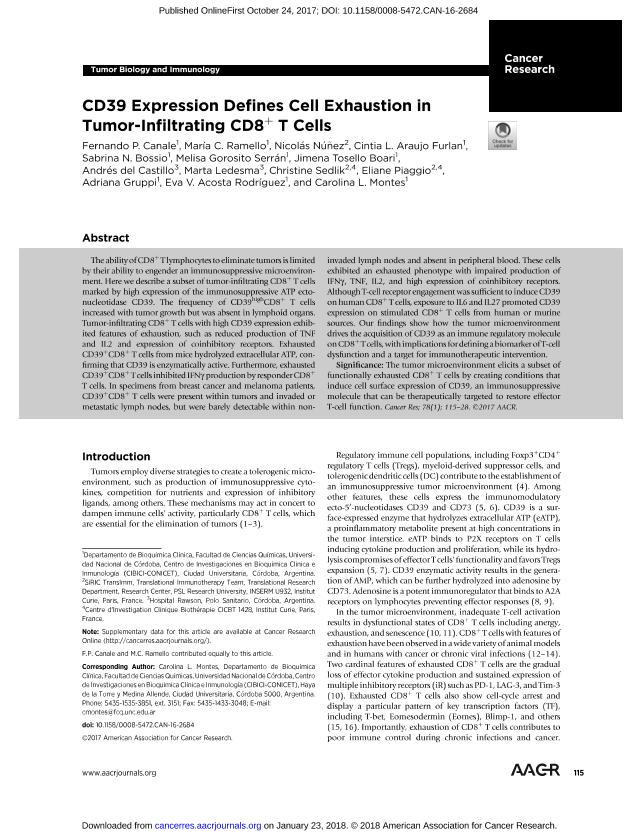Artículo
CD39 delineates cell exhaustion in human and mouse tumor-infiltrating CD8+ T cells
Canale, Fernando Pablo ; Ramello, María Cecilia
; Ramello, María Cecilia ; Núñez, Nicolás
; Núñez, Nicolás ; Araujo Furlan, Cintia Liliana
; Araujo Furlan, Cintia Liliana ; Bossio, Sabrina Noemí
; Bossio, Sabrina Noemí ; Gorosito Serran, Melisa
; Gorosito Serran, Melisa ; Tosello Boari, Jimena
; Tosello Boari, Jimena ; Del Castillo, Andrés; Ledesma, Marta; Sedlik, Christine; Piaggio, Elianne; Gruppi, Adriana
; Del Castillo, Andrés; Ledesma, Marta; Sedlik, Christine; Piaggio, Elianne; Gruppi, Adriana ; Acosta Rodriguez, Eva Virginia
; Acosta Rodriguez, Eva Virginia ; Montes, Carolina Lucia
; Montes, Carolina Lucia
 ; Ramello, María Cecilia
; Ramello, María Cecilia ; Núñez, Nicolás
; Núñez, Nicolás ; Araujo Furlan, Cintia Liliana
; Araujo Furlan, Cintia Liliana ; Bossio, Sabrina Noemí
; Bossio, Sabrina Noemí ; Gorosito Serran, Melisa
; Gorosito Serran, Melisa ; Tosello Boari, Jimena
; Tosello Boari, Jimena ; Del Castillo, Andrés; Ledesma, Marta; Sedlik, Christine; Piaggio, Elianne; Gruppi, Adriana
; Del Castillo, Andrés; Ledesma, Marta; Sedlik, Christine; Piaggio, Elianne; Gruppi, Adriana ; Acosta Rodriguez, Eva Virginia
; Acosta Rodriguez, Eva Virginia ; Montes, Carolina Lucia
; Montes, Carolina Lucia
Fecha de publicación:
10/2017
Editorial:
American Association for Cancer Research
Revista:
Cancer Research
ISSN:
0008-5472
e-ISSN:
1538-7445
Idioma:
Inglés
Tipo de recurso:
Artículo publicado
Clasificación temática:
Resumen
The ability of CD8+ T lymphocytes to eliminate tumors is limited by their ability to engender an immunosuppressive microenvironment. Here we describe a subset of tumor-infiltrating CD8+ T cells marked by high expression of the immunosuppressive ATP ectonucleotidase CD39. The frequency of CD39highCD8+ T cells increased with tumor growth but was absent in lymphoid organs. Tumor-infiltrating CD8+ T cells with high CD39 expression exhibited features of exhaustion, such as reduced production of TNF and IL2 and expression of coinhibitory receptors. Exhausted CD39+CD8+ T cells from mice hydrolyzed extracellular ATP, confirming that CD39 is enzymatically active. Furthermore, exhausted CD39+CD8+ T cells inhibited IFNg production by responderCD8+ T cells. In specimens from breast cancer and melanoma patients, CD39+CD8+ T cells were present within tumors and invaded or metastatic lymph nodes, but were barely detectable within noninvaded lymph nodes and absent in peripheral blood. These cells exhibited an exhausted phenotype with impaired production of IFNg, TNF, IL2, and high expression of coinhibitory receptors. Although T-cell receptor engagement was sufficient to induceCD39 on human CD8+ T cells, exposure to IL6 and IL27 promoted CD39 expression on stimulated CD8+ T cells from human or murine sources. Our findings show how the tumor microenvironment drives the acquisition of CD39 as an immune regulatory molecule onCD8+ T cells, withimplications for defining abiomarker of T-cell dysfunction and a target for immunotherapeutic intervention. Significance: The tumor microenvironment elicits a subset of functionally exhausted CD8+ T cells by creating conditions that induce cell surface expression of CD39, an immunosuppressive molecule that can be therapeutically targeted to restore effector T-cell function.
Palabras clave:
Thyroid Hormone Recebtor Β
,
Immunotherapy
,
Dendritic Cells
,
Tumor
Archivos asociados
Licencia
Identificadores
Colecciones
Articulos(CIBICI)
Articulos de CENTRO DE INV.EN BIOQUI.CLINICA E INMUNOLOGIA
Articulos de CENTRO DE INV.EN BIOQUI.CLINICA E INMUNOLOGIA
Citación
Canale, Fernando Pablo; Ramello, María Cecilia; Núñez, Nicolás; Araujo Furlan, Cintia Liliana; Bossio, Sabrina Noemí; et al.; CD39 delineates cell exhaustion in human and mouse tumor-infiltrating CD8+ T cells; American Association for Cancer Research; Cancer Research; 78; 1; 10-2017; 115-128
Compartir
Altmétricas



